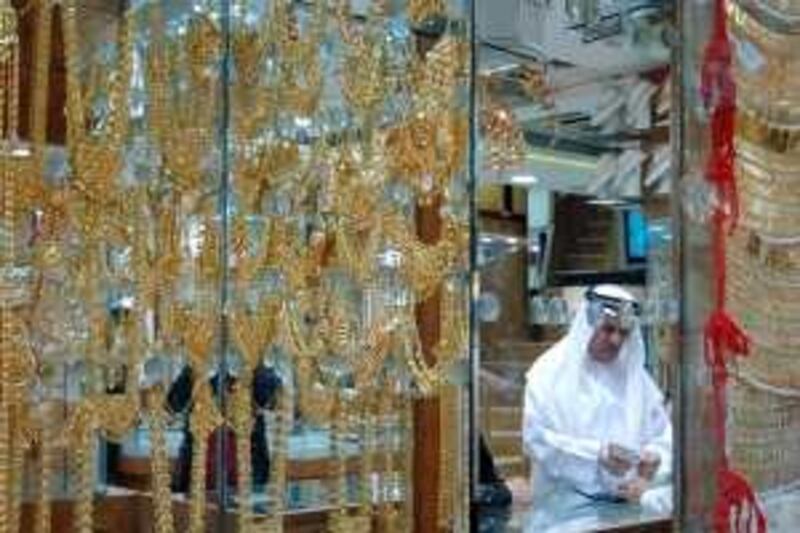Gold is the safe-haven asset of choice for many investors uncomfortable about the future. So perhaps NASDAQ Dubai chose the right time to launch the region's first Sharia-compliant tradable security backed by gold last week. The product's masterminds at the World Gold Council, which has sponsored 12 gold exchange traded funds (ETFs) across the globe that account for 85 per cent of the market, are betting on Dubai becoming their latest success story.
The price of gold has been rising eight years in a row. It traded in the middle of last month above US$1,000 (Dh3,673) an ounce for the first time in almost a year. Its highest level was $1,032 last March. Last year the metal gained 6 per cent in US dollar terms, the only asset class besides US Treasuries to rise. Meanwhile, the S&P 500 lost almost 40 per cent, and the Dubai Financial Market Index was down slightly more than 70 per cent.
"Gold does well when risk perceptions rise," says John Hathaway, the fund manager at US-based Tocqueville Asset Management. "It gets a look when interest rates are low, when spreads widen and when people are worried whether the dollar, the euro and banks in general are a safe place." There is no doubt that gold is having an unprecedented renaissance. "In the past, people saw gold as a relic of the [old times]," says Aram Shishmanian, the chief executive of the World Gold Council in London. "Now, they are rediscovering it as a means to preserve wealth."
Owen Rees, the executive director at Dubai Commodities Asset Management, the new product's local marketing agent, is equally upbeat. Mr Rees has been working the phones since the launch and says the "small trading volumes" - 1,060 shares changed hands on Tuesday, down from an initial 2,000 - is only a reflection of its recent introduction. Once institutional investors and brokerage firms finish studying the product, he expects volumes to rise.
Given the price gold has been fetching, even those central banks that had planned to sell their gold are holding off, preferring to preserve value. They are also asking some tough questions about their currency holdings, says Mr Hathaway. If the global gold rush is anything to go by, local interest in the Dubai gold security should pick up fast. And as the new security is backed by a real asset, a defined amount of gold, it is a natural choice for Sharia investing, involving neither interest nor derivatives that are both prohibited in Islam.
Dubai's gold security is structured like equity, unlike its Sharia-compliant counterparts in the UK or the US, which are essentially zero coupon bonds and are acceptable under Sharia law (but not optimal). "Essentially the investor owns a share of gold," Mr Rees says, adding that the product was made Sharia-compliant from the start. "Sharia compliancy was most definitely not an afterthought." If the global success of ETFs is anything to go by, Dubai"s gold security instrument has a fair chance.
Since 2003, when the first gold ETF was sold in Australia, the amount of assets held by all WGC-sponsored Exchange Traded Commodities backed by physical gold now amounts to $38 billion. That is more than the combined total of all the gold held by the five largest Middle-Eastern central banks. Because ETFs have made buying gold easy, the asset class is widely seen as a big part of the gold rush. "ETFs have been crucial in facilitating investment flows into gold," Mr Hathaway says. "Before it was cumbersome; you had to go to a coin dealer and take out physical gold."
Nevertheless, since pessimism is the flavour of the day in financial markets everywhere, here are two words of caution: First, Dubai relies heavily on retail investors and there may not yet be enough institutional investors to create the real critical mass for the gold security to take off. After all you want narrow spreads to make the product truly tradable. Next, while Sharia-compliant investing is doing well, it does not guarantee automatic success. The industry, for instance, was perhaps too enthusiastic about a number of projects, such as platforms for Sharia-compliant hedge funds that have quietly fallen by the wayside.
But some still believe Islamic finance could grow as much as 15 per cent this year. While the rise in gold prices is good news for those who have already invested, it is unfortunately bad news for all the fathers buying dowries for their daughters, and for shopkeepers selling (the now seemingly priceless) jewellery made from the precious metal. After China and India, the Middle East is the next largest centre of gold jewellery demand, which is falling as investment appetite for the metal pushes up prices.
Shopkeepers in the gold souks of Abu Dhabi and Dubai are standing idle. Retail sales in Abu Dhabi's gold market have fallen by more than 70 per cent, according to the Gold and Jewellery Group, due to high prices. There will be fewer and fewer people who can afford the intricate jewellery pieces in their windows. Mr Hathaway predicts that gold in the future "could trade at a multiple" of today's prices. If so, that will be good news for Dubai's new gold security. But certainly not for dowry buyers.
uharnischfeger@thenational.ae





